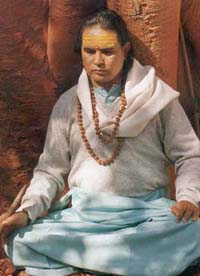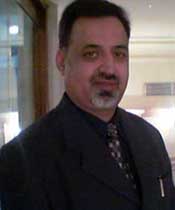
From the book "Teachings
of Babaji"
In the Kumaon foothills
of the Indian Himalayas, the birthplace or home of many of India's great
saints of the past and present,
there lived Shri Hairakhan Wale Baba. To those who asked,
Hairakhan Baba sometimes
acknowledged that he is the Shiva Mahavatar Babaji, known to
hundreds of thousands in
the world through Paramahansa Yogananda's Autobiography of a Yogi.
A mahavatar is a human manifestation
of God, not born of woman
Shri Babaji
('Shri' is a title of respect; 'Baba' is a term used for a renunciate,
or saint or a holy
Father) appeared in June
1970 in a cave that has been holy for thousands of years at the foot of
the Kumaon Mount Kailash,
across the sacred river Gautama Ganga from a remote village called
Hairakhan, in the Nainital
District of Uttar Pradesh. He had no known parents or family, he
appeared as a youth of 18
or so, yet he displayed great wisdom and power- divine powers from the
start. Some Hairakhan villagers
saw him as an old man with a long, white beard; others as a young
man with a long beard; others
as a beautiful young man with no beard. Two men spoke to him at
the same time-one saw an
old man with a beard, the other saw a young man with no beard. He was
seen in different places
at the same time. He knew the scriptures and could quote them in Sanskrit
as well as in Hindi, yet
there is no evidence of his having been 'educated'. He ate almost nothing
for months on end-two or
three years-yet his energy was boundless.
Late in September 1970, he
walked to the top of Mount Kailash with a small group of men, seated
him self yogi-fashion at
the small, old temple there and sat for forty-five days without leaving
his
seat, meditating much of
the time, talking occasionally, preparing and blessing fruits and
vegetables to give to others
and starting to teach the message he brought to the world. Hundreds
of people came in October
to celebrate the nine-day religious festival of Navaratri with him at the
top of Mount Kailash.
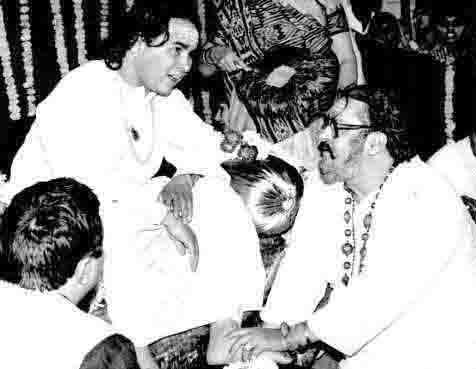
His coming has been foretold-both
by ancient scriptures and the preaching and prophesying of a
20th century Indian saint
called Mahendra Baba, or Mahendra Maharaj. As a child, Mahendra
Baba was healed by a vision
of Babaji and the Divine Mother; he saw Babaji again on an early
birthday when Babaji gave
him sweets. As a boy just out of high school, Mahendra Baba met
Babaji, in one of his previous
human forms, and was taught yogic knowledge by Babaji for six
days and nights. When Babaji
left him, Mahendra Baba did not know who he was or where to find
him again. After completing
his Master of Arts degree in philosophy, Mahendra Baba renounced
the world and went searching
for this guru-walking through the Himalayas in India, Nepal, Tibet
and China. He then spent
years at temples in the Indian states of Gujarat and Uttar Pradesh and
developed a reputation as
a saint. Only after twenty years or more of searching and waiting was he
led back to the Kumaon Hills
where Babaji appeared to him again, in a locked room in a remote
mountain ashram.
After this appearance of
Babaji, in the flesh, Mahendra Baba, at Babaji's instructions, began a
mission of preparing for
Shri Babaji's return to the world in human form. For many years he went
around India, preaching
that Babaji would return to transform the world by changing the hearts
and minds of men. He described
what Babaji would look like, including the scars on his right leg
and left arm; he said that
Babaji would come in 1970. Mahendra Baba restored old ashrams and
temples, built new ones
and prepared the worship service now used by Shri Babaji's devotees.
Mahendra Maharaj told his
followers that Shri Babaji has been a human manifestation of God
since man first learned
about religion. Babaji has taught gurus and other religious teachers
throughout history, always
trying to turn man towards God and spiritual values. Through the ages
he has appeared to teach
people, manifesting a body for each appearance, rather than coming by
human birth. Yogananda wrote
of his and other people's experiences with this immortal Babaji in
the l9th and early 20th
centuries.
There are books in Hindi
written about the previous manifestation of Hairakhan Baba, which
lasted from about 1800 to
1922. Around the year 1800, he appeared to villagers not far from
Hairakhan, out of a ball
of light, and, in 1922, before a handful of followers, he disappeared into
a
ball of light. There are
many recorded miracles-healing people, restoring the dead to life, feeding
multitudes from a small
portion of food, changing his form, being in two or more places at one
time, feeding a sacred fire
with water when ghee (clarified butter) was not available. But mostly,
people flocked to him because
they experienced him as a divine, wise, loving being far above the
human level. Mountain villagers
(educated and uneducated) Westerners, English bureaucrats and
soldiers, Indian intelligentsia,
rich and poor, people of all religions came to him. There are still
people in Hairakhan and
elsewhere in India, who remember the 'Old Hairakhan Baba' and
experienced this manifestation
as the same Being.
There are evidences of yet
earlier manifestations. Tibetan monks came to Shri Babaji in 1972 and
hailed him as 'Lama Baba'
who had lived in Tibet about 500 years ago. There are stories of his
appearance in Nepal as well
as in India and Tibet. On two or three occasions, Babaji said he was
one of the teachers of Jesus
Christ.
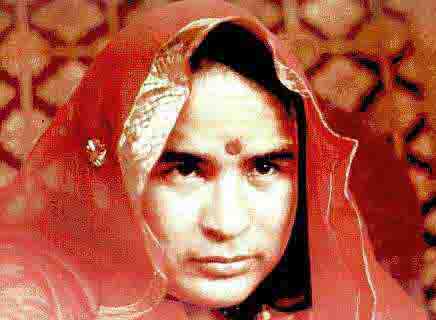
Most of Shri Babaji's followers
experience and worship him as a true, ageless manifestation of
God. The big and little
miracles he performed daily in the lives of his followers, his reading
and
responding to their thoughts
before they were uttered, his healing, his guidance, his teachings are
at a level beyond even advanced
human ability. The dramatic, external miracles were infrequent;
most of his miracles occurred
in the minds, hearts and lives of his followers-miracles of
understanding, guidance,
teaching and support when, where and as needed.
Shri Babaji said that mankind
is in great danger during the period of Kali Yuga-the Age of the rise
of materialism and the decline
of spiritual life. He foretold of widespread physical destruction and
change and death in this
decade. He said that those who truly worship God (in any of the ways
man knows Him) and repeat
His name and live in harmony with the Universe will be saved and
that a new, humanitarian
society of people who are focused on God will be formed.
In order to
focus people's minds on God, Babaji taught people to repeat the ancient
mantra OM
NAMAHA SHIVAYA. It is a
Sanskrit phrase which means something like 'I surrender to bow to /
take refuge in God'. Repetition
of Om Namaha Shivaya is a pathway to unity with the Supreme
God. (The name of God used
in this mantra is Lord Shiva Who is a Hindu conception of the one
Supreme God. This mantra
has been used for millennia and taught by saints and gurus in India
and the West.) Constant
repetition of a mantra (the repetition is called japa) focuses the mind
on
God, opens one's heart and
mind to God, and stops or reduces the inherent tendency of one's
mind to constantly plan,
worry, day-dream or otherwise prattle away in really useless activity.
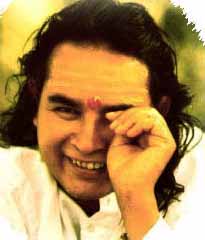
The main purpose
of Shri Babaji's coming in a human manifestation at this time was to reform
the hearts and minds of
men. He came to remove confusion and evil from mankind. Babaji once
said: "The mind can be purified
only by japa. This is the only medicine for the disease of the
mind. While your mind and
heart are impure, how can God live in your heart ? The water to clean
your heart is the Name of
God. So teach everyone to repeat the name of God everywhere. "
The mind that is generally
focused on God's Name responds, when the need arises, spontaneously
to perform its required
functions quickly, easily and well. Babaji emphasized Om Namaha Shivaya
but also gave other mantras
on occasion: the essence of his instruction is 'Repeat God's name'.
Shri Babaji said that when
the great destruction comes to thc world, those who believe in and
worship God sincerely and
especially those who repeat His Name(s), will be saved by the power of
the mantra. "God's Names
are more powerful than a thousand atomic and hydrogen bombs".
Although Shri Babaji lived
in a Hindu culture and was worshipped through Hindu rituals daily, he
was not attached to any
particular religion. He stated that all religions can lead the sincere
devotee
to God. At Hairakhan, Shri
Babaji was worshipped by Hindus, Christians, Buddhists, Jews, Sikhs,
Moslems-even atheists found
themselves bowing to him. He often reminded his followers that all
mankind is one family-the
Family of God. For those who asked about religion, he answered,
"Follow the religion that
is in your heart". He however, said at many times that. He had come to
re-establish the principles
of the Sanatan Dharma-the Eternal Religion, which was ageless and
from which all other religions
have taken their roots.
Even before his re-appearance
in 1970, Babaji taught Mahendra Maharaj to preach that all lovers
of God should lead lives
based on Truth, Simplicity and Love. This, he said, is the essence of all
religions. It is very difficult
to nurture hatred, greed, anger, lust, jealousy and selfishness and the
violence they breed when
a person tries hard to live in truth, simply and lovingly with all.
To all who came to see him
he told over and over that karma yoga-unselfish work-dedicated to
God is the best, easiest,
most rewarding quickest way to God in this chaotic, confused era of
change. At his ashram in
Hairakhan, work morning and afternoon is a vital part of the daily
schedule. There is time
for meditation in the early morning, after a bath in the river, but Babaji
insisted on several hours
of karma yoga daily, during which time one is expected to work with
constant repetition of the
mantra.
"To follow and demonstrate
the path of Truth, Simplicity and Love is man's supreme duty and
the highest Yoga. Diligent
work is a quality of this Path, for laziness is death on earth. Only by
work can one claim victory
over karma. All must strive to do their duty in the best way possible
and not wander from that
duty. Service to humanity is the first duty. During these times,
inhumanity and laziness
have increased, so it is important that you work hard and not lose heart.
Be brave, bc industrious:
work hard and have courage. "
Although Sri Babaji called
many Westerners to him, by dreams, visions, pamphlets or simply
through one friend ,telling
another about him, he did not seek to establish a great personal
following. His small ashram,
four miles up a winding riverbed from the end of the nearest country
road, could not accommodate
the thousands who have flocked to other: saints and gurus. But,
though he made no general
call for people to come to see him, he did want all the world to hear
his message.
During the first year or
two after his appearance, Shri Babaji hardly spoke at all in public.
Although he engaged in easy
conversation with people for the last eight or ten years of his
mission, it was only in
the last five years of his mission that he began to give little instructive
talks
to his devotees-very infrequently
at first, then more often. The talks came mostly after the evening
worship service when his
devotees sat around Babaji singing hymns (kirtan) and enjoying the
powerful uplift of his presence.
Babaji would stop the singing and speak. His talks were made in
Hindi, so when he wanted
foreign devotees to hear the message, Babaji called on some bilingual
devotees to translate. The
translators were not professional translators. Some devotees would take
down the translation as
it was given and the next day the translator and transcriber tried to
re-create babaji's speeches
in English. In February 1983 Babaji gave permission to tape record the
speeches, so the speeches
from then on are fuller and more accurately translated. Although the
speeches which this book
contains are not perfect, literal translations, they do catch the flavor
of
Babaji's speech and they
must present his message adequately because he approved this
publication.
The book also contains a
few speeches, made in the presence of Shri Babaji and at his rcqucst, by
Shri Vishnu Datt Shastri
and Amar Singh Yadav. 'Shastriji' is a scholar of the Vedas (the earliest
Hindu Scriptures), a man
whom Babaji calls the purest man on earth, and Babaji himself said that
he inspires Shastriji to
speak for him. There are also a few speeches made by the Governor of the
Indian state of Uttar Pradesh
and the Kumaon Commissioner (a senior administration officer of
the state) in the presence
of Shri Babaji.
These talks speak for themselves.
However, the interpretation and understanding of Shri Babaji's
words may not be so easy
as a reader may at first assume. Those who have worked for Babaji at
Hairakhan and elsewhere
have come to realize something of the depth and subtlety of all of
Babaji's words and actions.
His words and acts were understood at different levels as a person
experienced and later recalled
them-the same words and acts touch different people in different
ways. Beyond saying this,
it is not possible to assist the reader in understanding Shri Babaji's
message, except perhaps
to note that the old methods of thought are not going to serve in the New
World any better than the
old patterns of societal action.
Shri Babaji's speeches reflected
his consciousness of himself as a manifestation of God; he often
called himself (in these
talks) Shri Mahaprabhuji, a Hindi expression for the Supreme Master. For
those who know him as a
manifestation, incarnation of God, these speeches present a consistent,
powerful inspiring message
from a loving God who seeks to guide His devotees through a time of
chaos and destruction into
a new "Promised Land"-a society based on high spiritual and moral
values.
Shri Babaji did not require
people to see or worship him as a manifestation of God in order to
come to him and be benefitted
by him. He himself said of his human form,, "This body is nothing,
it is here only to serve
people".
Shri Babaji left his mortal
body on February 14, 1984. Early in his mission, he had told two or
three devotees that he would
leave his body in 1984. Before he came, he told Mahendra Maharaj
that he would come to give
a message to mankind. He came he lived his message; he spoke his
message; his message was
published; and having completed this mission, he left. As the Governor
of Uttar Pradesh, the Honorable
C.P.N. Singh remarked, "There is no difference between His
speech and His action."
This book contains his spoken
message. The concepts in it are not new; you can find similar
teachings in the old Hindu
scriptures, the Bible, the Koran, the Guru Granth Sahib, Zoroastrian
scriptures. But in a world
which is focused almost entirely on material values and goals, this
message, with its strong
humanistic and spiritual emphasis, is a message of Revolution. Babaji
frequently warned that a
revolution (mahakranti) is coming. He told what it would be like and
how to survive it. On the
13th of February 1984 he told some visitors. "The mahakranti must
come because everyone thinks
in terms of 'I' and 'my' and everyone wants to be big and no one
wants to be small. The Revolution
that he came to inspire is a revolution of thinking and
feeling-of mind and heart-but
he indicated that it could not take place without a physical, material
revolution that would destroy
the old society and patterns of thought.
He came to show mankind how
to live, to serve Man on the highest level. Let him serve you. Read
his message with an open
mind and let him bless you.
|
